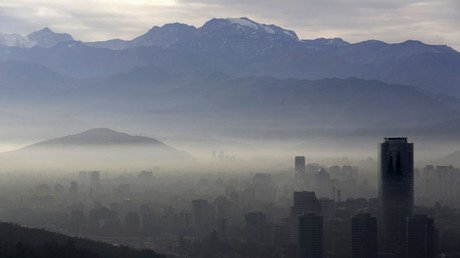Scientists in China invent new material to clean up oil spills
Chinese scientists have invented a honeycomb-style polypropylene material that can soak up oil from water more cheaply and efficiently than some popular established methods.
The material according to a press release, is essentially foam with a rough surface and a tubular structure modeled on honeycombs. This structure allows water to flow freely through the tubes while oil gets caught and absorbed in seconds, the researchers from Ningbo Institute of Materials Technology said.
While we don’t see many oil spills of Deepwater Horizon proportions on a regular basis, luckily, the problem of oil-contaminated water is a serious one simply because, as the Chinese scientists note in their research, oil and oil derivatives are used in so many industrial activities that also involve water at some point. The result is oily water that cannot be cleaned by setting it on fire (a common method for waterborne oil cleanup if not very environmentally friendly) or filtering it in another way.
Also on rt.com ‘Next Deepwater Horizon disaster a matter of time’: Critics slam record offshore oil lease saleThe news from the Chinese institute come soon after another invention in this field: a sorbent material that can absorb oil without also absorbing a lot of water. Called a plasma-polymerized carbonaceous nanosponge and developed by Argentine scientists, the material is a powder that “can be used to selectively and efficiently adsorb hydrocarbons from water, with negligible water uptake.” The material can work on its own or be used as coating for textiles or metal meshes as a barrier between oil and water.
Oil water separation research certainly looks like an exciting field. Some more news in it came from Texas earlier this month. Two young entrepreneurs there developed what they’ve called Towelie: a cheap fabric that can hold up to 15 times its weight in oil. The towel-like unwoven material is cheap and it floats without leaving any microplastic residue in the water. What’s more, it’s made from natural cotton fibers. Things don’t get any eco-friendlier than this.
Also on rt.com ‘Environmental disaster’ as tons of oil spills into UNESCO protected watersOf course, for all their benefits, these different materials certainly have drawbacks since they were made in an imperfect world.
The Chinese invention, for example, is made from polypropylene, which is an oil—or gas—derivative. This probably contributes significantly to its affordability but does not, strictly speaking, make it completely environmentally friendly in terms of production. Also, plastic-based sorbents leave microplastic residue in the water.
The nanosponge invented by the Argentine scientists can absorb oil for half an hour under UV radiation but then it begins to soak up water as well, which compromises its effectiveness.
Also on rt.com BP thinks an oil spill in Australia would be ‘welcome boost’ for localsThe cotton-based Towelie is already used in the Permian for minor leaks at wellheads and as a replacement for synthetic towels widely used in the oil production industry. Yet it doesn’t seem like the best idea for a major offshore spill: a major spill would require thousands of Towelies that would then have to be collected and the oil disposed of.
All in all, however, it’s good to know there is an ongoing effort to make potential oil spills and leaks less devastating and clean them up more quickly with less water getting wasted in the process.
This article was originally published on Oilprice.com














